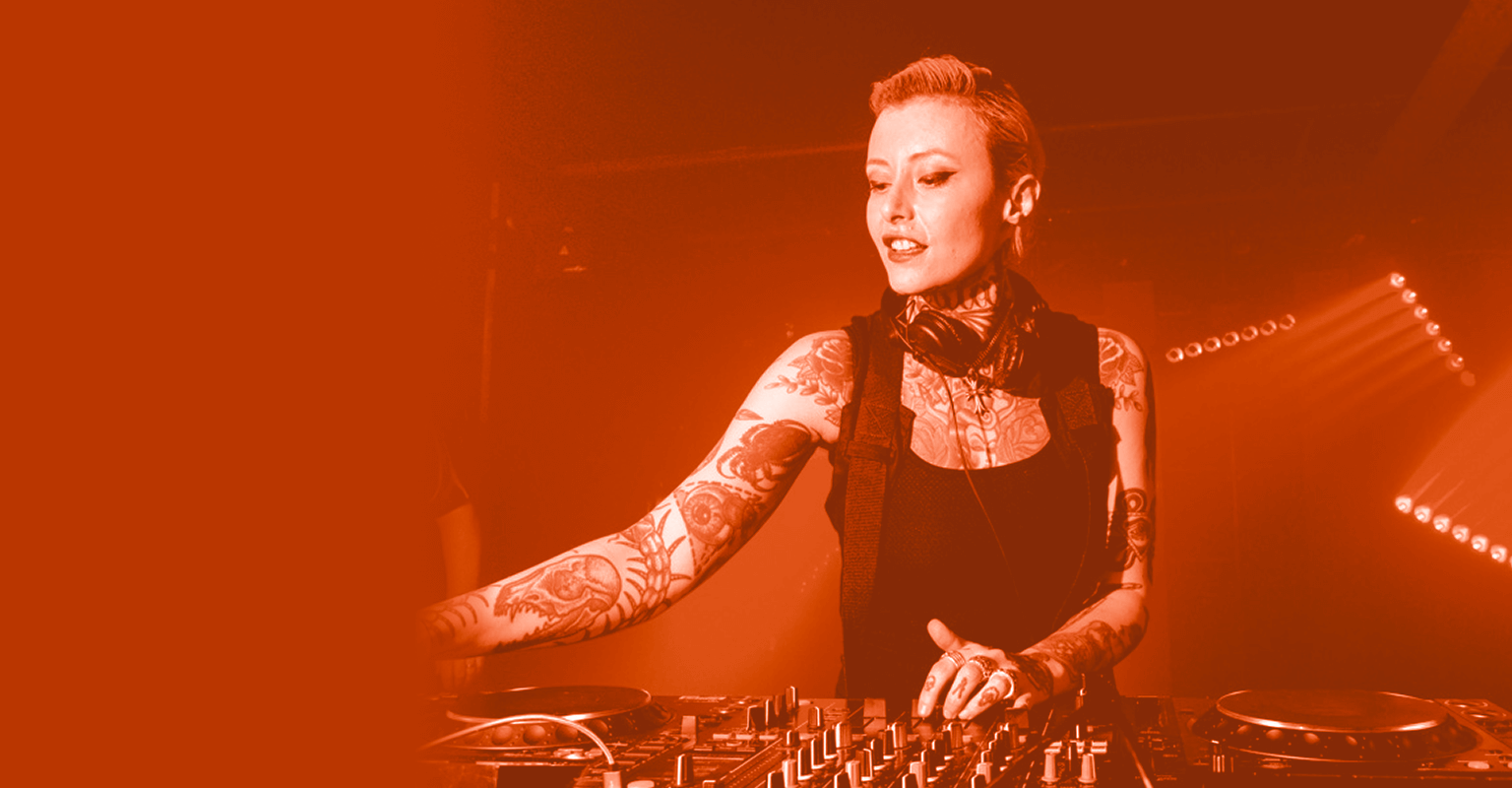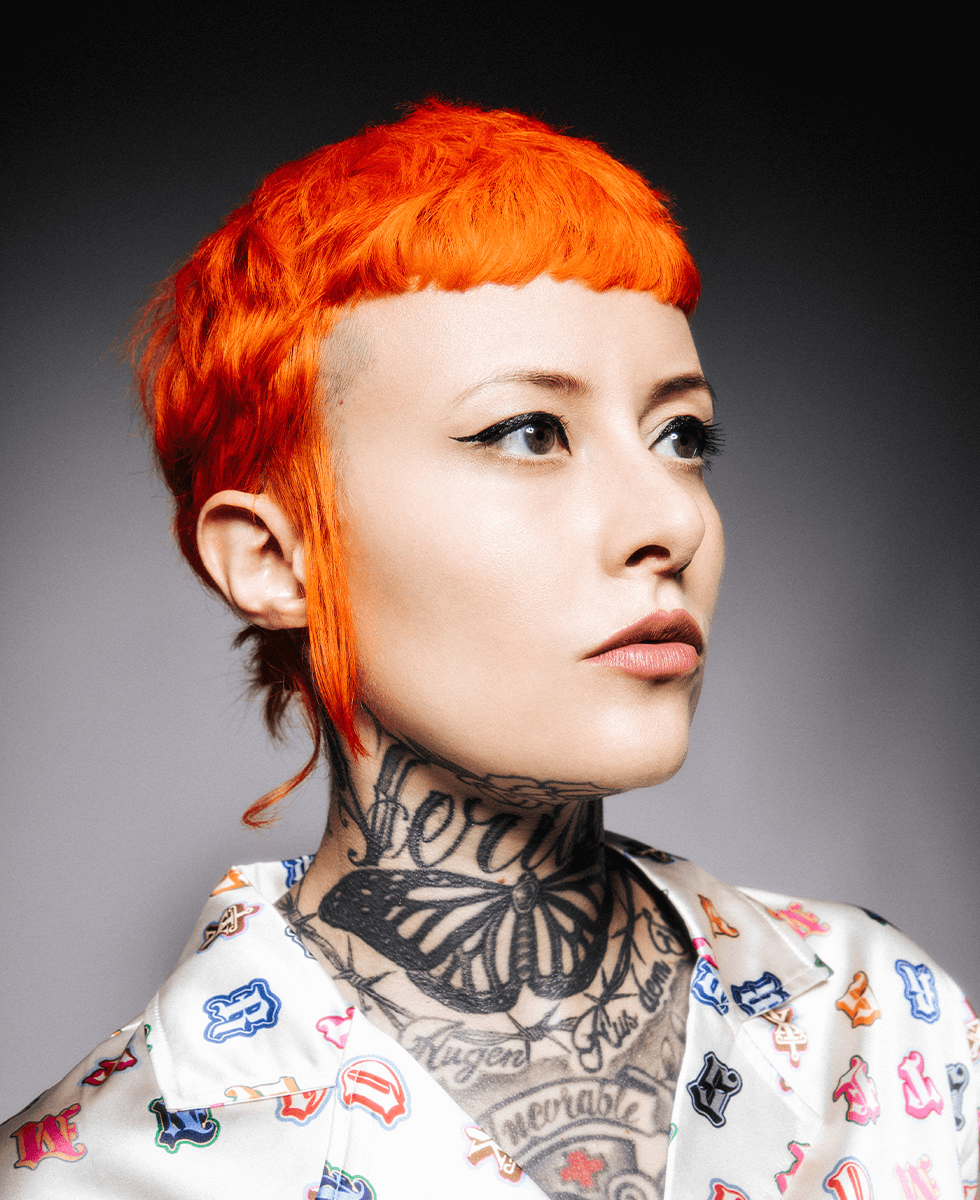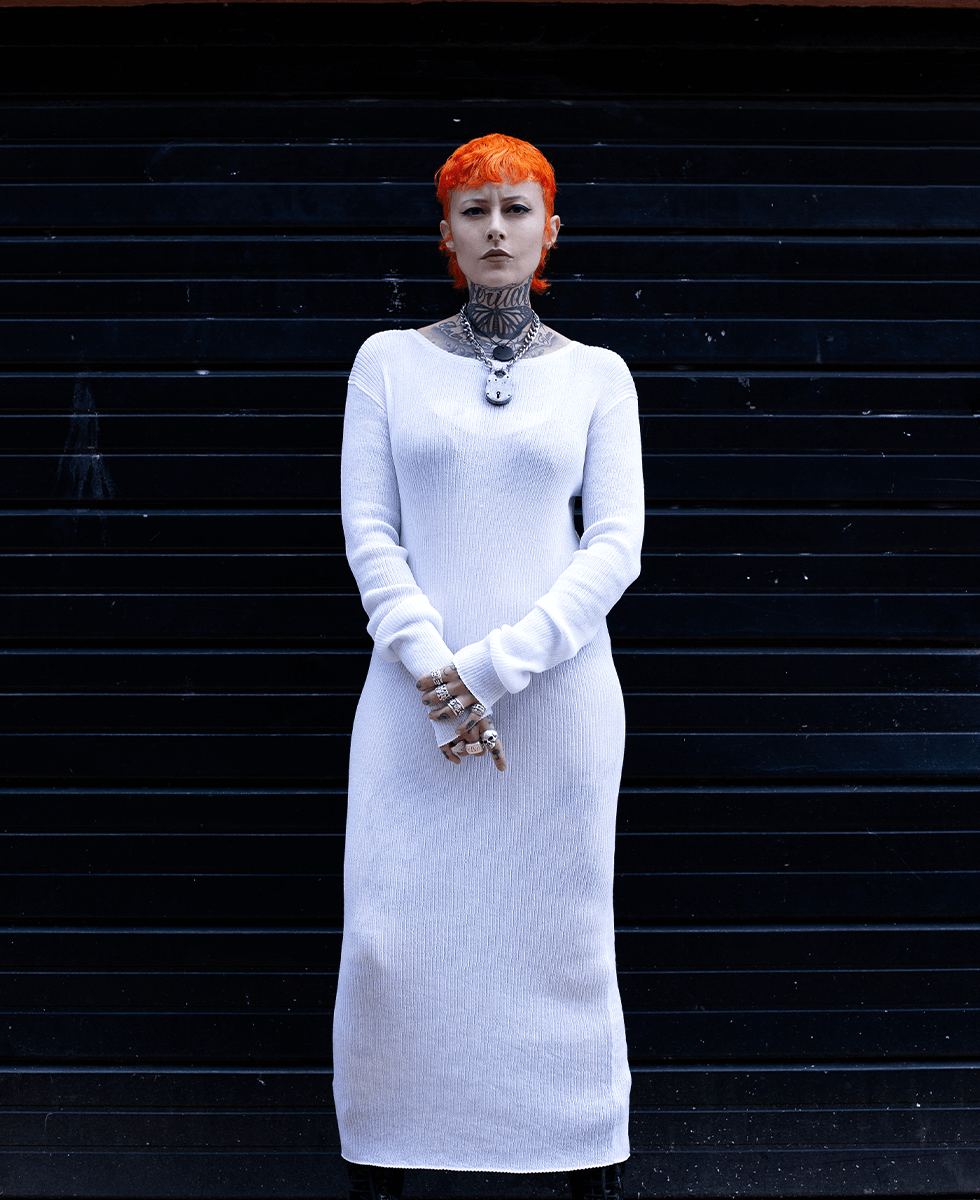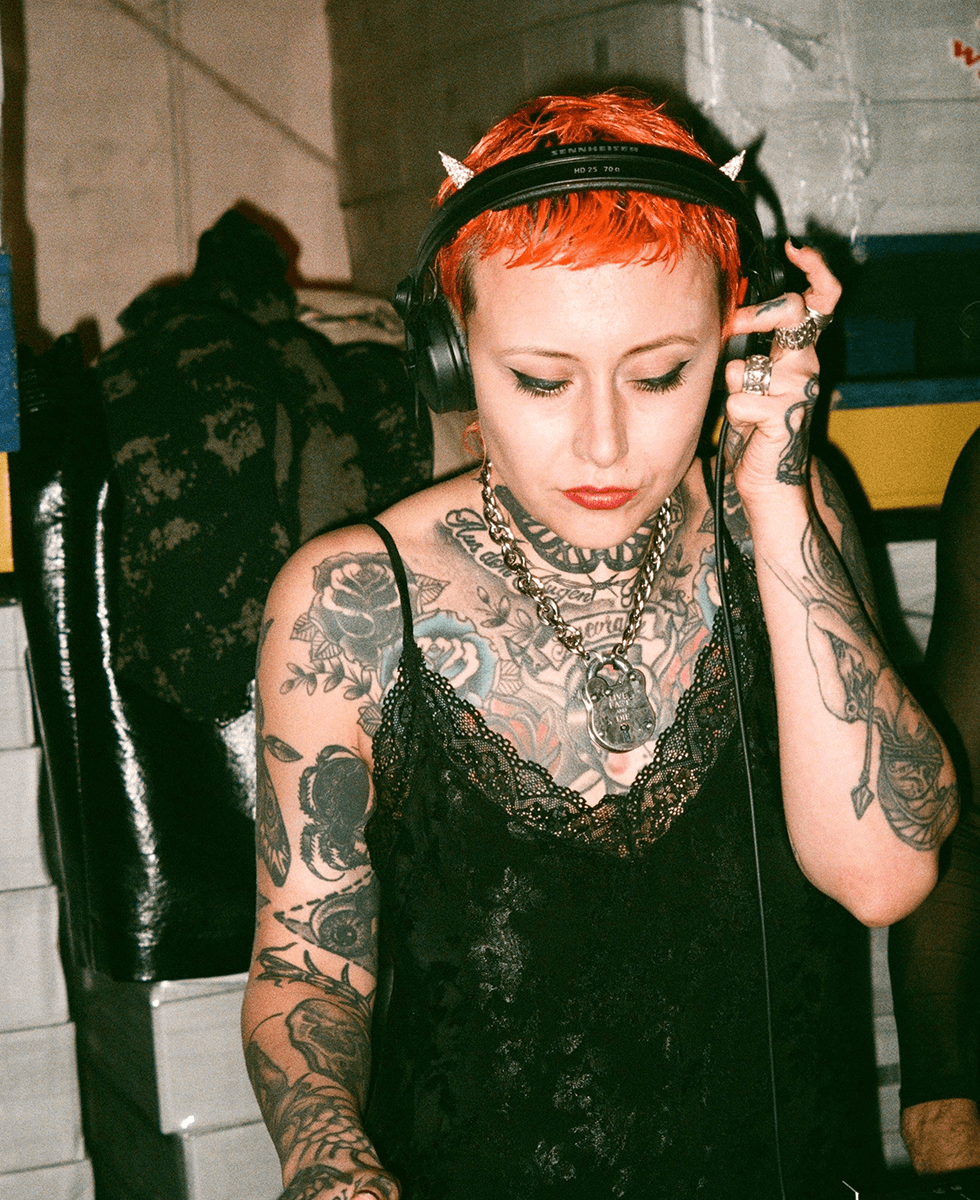The radical power of sticking to your guts: In conversation with Samantha Togni

Renowned DJ, producer and promoter Samantha Togni discusses the unifying power of social media for marginalised communities and creating spaces for the headliners of tomorrow.
“Growing up, it was important to connect my music and art to my upbringing and my journey towards self-discovery both as a person and artist,” says Samantha Togni. “My creative approach is to connect these things from my world beyond art and music and to express them in my work.”
Samantha Togni is an internationally renowned DJ, producer and promoter who has headlined in clubs from Tokyo to Milan with an experimental sound that captivates audiences across the globe. Just as her music is radical, Togni’s work to amplify voices in marginalised communities bears the same approach. Founder of London-based label Boudica, Togni has created a platform for women, trans and non-binary folk, and continues to create space across the music industry for new artists in the LGBTQ+ community to find their voices.
“I want to be remembered as a great producer, DJ, and curator but I want to do it with a positive message that supports minorities and gives a platform to marginalised communities.”
Togni has always been an advocate for music that carries an impactful statement. “I’m not saying that music should always carry a political message but considering the times we’re living in and the fact that social media is so connected to your artistry, I think that if we have a tool to bring awareness to subjects like diversity and unity, it’s important that we should use it to send a message.”
Through her various projects, Togni focuses on the art itself as well as promoting the community and making statements about gender and identities. These projects include her visual art, Boudica – a London label and party series exploring the darker side of electronic music platforming women, trans and non-binary folks, and events like Flesh – a UK queer music festival. “I want to be remembered as a great producer, DJ, and curator but I want to do it with a positive message that supports minorities and gives a platform to marginalised communities.”

Togni’s entry into the music industry was built on formative experiences growing up in London’s punk and electronic music scenes as a teenager. “When I moved to London at 17 and discovered the rave scene and electronic music, that of course had a big impact on me,” she explains. “Growing up in the punk scene influenced my career the most – both musically in terms of the energetic, upbeat sound that punk carries, and also in the collective community spirit that reflects the ethos of the scene. Looking back, being part of the punk scene was formative for me and probably the thing that inspired me the most because of its devotion to music and the sense of belonging it gave me.”
That feeling of belonging can be hard to come by – finding yourself within these communities can be freeing, and it is crucial to have these spaces in order for queerness, trans, gay, and non-binary gender expression to develop. “These statements about self-expression and creating spaces are vital for making our community feel safe,” says Togni. “Many people, both audiences and other organisations, fail to understand how important they are. We don’t feel safe in certain places, in the street, at night, or in clubs where people are sometimes being verbally or even physically hurt.”
“These statements about self-expression and creating spaces are vital for making our community feel safe”
“However, I do think that people are starting to understand how important it is for our community to have access to spaces in which they feel safe to be who they want, dress how they like, express themselves, and be free from judgment,” she continues. “A large part of the industry has understood how essential these spaces are, not just for the LGBTQ+ community, but for other marginalised communities too. That’s a huge positive; we’ve voiced how uncomfortable and unsafe we often feel in spaces like clubs and festivals, and people are taking notice.”
Sticking to your guts
Building a community around her work as a DJ and hosting events wasn’t a conscious effort, but something that developed naturally as a result of Togni’s inspiring surroundings. “I’ve been a part of the queer scene for as long as I can remember,” she explains. “Since I was a teenager going out in the punk scene until now, there are so many connections between the two and I really live and breathe it. Everything I’ve done has been an authentic, natural progression and reflection of my ideologies and beliefs. I never planned to build a business, it just happened.”
“I really believe that the success of my projects is because I always maintained authenticity in my work and never compromised but stuck to who I am and what I believe in,” she continues. “I think that in a society where we’re prescribed a prototype of what success looks like and pushed to mould our mentality towards it, even within the microcosm of the techno/queer scene, the most radical choice you can make is to stick to your guts.”
“I really believe that the success of my projects is because I always maintained authenticity in my work and never compromised but stuck to who I am and what I believe in”
Safe spaces for music and art have changed dramatically over lockdowns and have had to evolve to survive in a pandemic conscious world. Togni has seen first-hand how COVID brought new difficulties to the safe spaces she had built for her community. “We were separated and didn’t have access to the spaces in which we could make connections with like-minded people who share similar views and experiences,” she explains. “It was also really disheartening to see the government’s approach to nightlife and their failure to understand its importance in offering sanctuaries for people to thrive and be free.”

“It was hard to navigate that not just for me as an artist, as I still had ways to express my art through social media and work on it behind the scenes, but because of the responsibility I felt I had towards mine and Boudica’s community and the promise of maintaining a space where female and non-binary individuals are prioritised.”
These challenges resulted in Togni devising new ways to reach out to her community and stay connected despite distance. “During the pandemic, I launched Boudica Music Conference which was streamed from the Freemason’s Hall and had an incredible response. I used social media to stay as connected as possible with my community, which was eye-opening for me as I saw new perspectives. A sense of empathy grew within me; I could put myself in other people’s shoes, who have different needs than mine.”
“I used social media to stay as connected as possible with my community, which was eye-opening for me as I saw new perspectives.”
With this in mind, Togni states that this year’s Boudica Music Conference will be streamed online for free. She wants to make the information provided at these conferences accessible to all in the community, including those in different financial situations, and those who don’t feel comfortable being surrounded by people in public spaces.
Togni remarks that the pandemic has had a positive impact in creating digital spaces for her community to feel safe. “Alongside Spaces App, other collectives and I have put together the Queer London Network, which offers a space outside of nightclubs for the community to have conversations and connect in different ways.”
Lockdown not only changed Togni’s approach to community spaces online and in-person, but it also changed Togni’s mindset towards art and creation. “I don’t think lockdown had a direct effect on my creative output, but it did teach me the importance of getting inspired and learning to take a step back to trust and enjoy the process,” she says. “It’s not just about finishing a track or a project. The research and inspiration are all part of it, not just the final outcome.”
“I don’t think lockdown had a direct effect on my creative output, but it did teach me the importance of getting inspired and learning to take a step back to trust and enjoy the process”
“The biggest lesson I learned creatively from lockdown is that there’s nothing more precious than downtime and making a conscious decision to take time off,” she continues. “Time spent away from work with loved ones is just as important to the creative process as everything else because you need to rest to avoid burnout.”

Authentic action for real change
As ever, a greater call for inclusivity and representation in all forms of media relies not only on grassroots communities doing the work, but on larger companies in the music industry providing crucial support.
“There has been a big discussion about diversity and inclusion across lots of industries lately but particularly within music,” remarks Togni. “There’s a sense of collective awareness now which is pretty high in forward-thinking cities like London and Berlin. This is awareness of the fact that there is disparity throughout the industry and the need to change it. In these specific places, we’re all aware that action is needed and it’s important to talk about it, but the next step is taking authentic action and creating meaningful opportunities for people from minority communities to succeed and flourish.”
“The next step is taking authentic action and creating meaningful opportunities for people from minority communities to succeed and flourish.”
This is why Togni has made great strides in creating space and platforms to give these underrepresented identities chances to enter the industry and forge their own paths. “With Boudica, we platform underrepresented artists from gender minorities in an authentic way, by giving them a chance to close the party or take the slot right before the headliner even if perhaps they’ve never done so before. Similarly, when we did Flesh, we thought about how we could give back to the community and came up with the idea to run a competition for newcomers to win two donated scholarships with London Sound Academy, and a chance to perform at the festival.”
Togni considers now to be a crucial time for big organisations to take real action and create spaces for underrepresented artists and give them prime opportunities so they can be the headliners of the future. “We complain that there aren’t enough diverse headliners of tomorrow, but if we don’t give them a chance, how can there ever be? Also, there definitely needs to be a push to actively create more opportunities for minority groups to be in positions of decision-making.”
Just as Togni believes that music should carry an important message with it, she wants to carry those same important messages across her platform and use her influence to advocate for emerging LGBTQ+ voices. “As an artist, promoter and curator, I believe that I have a responsibility toward younger generations,” she explains. “I want to make sure that the spaces I create, both online and physical, are spaces where people can feel represented and able to express themselves freely, be it their gender identity or sexual orientation. I’m aware that I have a voice and I think it’s important that I use it to support and encourage the younger LGBTQ+ generation to thrive.”
Discover Samantha Togni on Mixcloud, SoundCloud, Facebook and Instagram.
Words: Zainab Hassan

